PBS News: December 10 – 15.2019, Dec 6,2019 – Shields and Brooks on impeachment evidence, Pelosi’s powerful moment, and Why is a Nobel-winning human rights activist defending Myanmar on Rohingya atrocities?
BBC Click: A Vision of The World In 2040, Inside Taiwan’s Tech Industry,
Pocket Worthy: Stronger Than Steel, Able to Stop a Speeding Bullet
TED Talks: Suchitra Krishnan Sarin What you should know about vaping and e cigarettes?, Krishna Sudhir How do cigarettes affect the body, Nicole Avena how sugar affects the brain, and Jody Williams A realistic vision for world peace
Nobel Women’s Initiative: Time to break the silence – Nobel Laureates to Aung San Suu Kyi, Nobel Women’s Initiative Statement on the persecution of Rohingya women, and Meet The Laureates
The Atlantic: Top 25 news photos 2019 – A wounded Syrian girl awaits rescue from under the rubble next to the body of her sister (hands visible at right), who did not survive a regime bombardment in Khan Sheikhun in the southern countryside of the rebel-held Idlib province, on February 26, 2019. Five months after this photo, the Syrian photographer who took it, Anas Al-Dyab, was killed in an air strike in Khan Sheikhun. Al-Dyab was also a member of the “White Helmets,” a group of volunteers carrying out search-and-rescue efforts in Syria.
Ing-On Vibulbhan-Watts’ Video: Golden Swallowtail Butterfly (8:15 minutes)
PBS NewsHour Weekend full episode December 15, 2019
Dec 15, 2019 PBS NewsHour
On this edition for Sunday, December 15, the House prepares for a historic impeachment vote, how the decline of local news is impacting civic engagement, a new documentary sheds light on Border Patrol expansion, and the Italian town of Riace went from being a haven for migrants to becoming a relative ghost town. Hari Sreenivasan anchors from New York. Stream your PBS favorites with the PBS app: https://to.pbs.org/2Jb8twG Find more from PBS NewsHour at https://www.pbs.org/newshour Subscribe to our YouTube channel: https://bit.ly/2HfsCD6
PBS NewsHour Weekend live show December 14. 2019
Streamed live 2 hours ago PBS NewsHour
On this edition for Saturday, December 14, the House gets one step closer to impeaching President Trump, a peace deal in Afghanistan faces new challenges, and how illusionist Derren Brown is pushing the boundaries of mentalism. Hari Sreenivasan anchors from New York. Stream your PBS favorites with the PBS app: https://to.pbs.org/2Jb8twG Find more from PBS NewsHour at https://www.pbs.org/newshour Subscribe to our YouTube channel: https://bit.ly/2HfsCD6
PBS NewHour full episode Dec 13, 2019
Dec 13, 2019 PBS NewsHour
Friday on the NewsHour, the House Judiciary Committee passes two articles of impeachment against President Trump, along party lines. Plus: What’s in the first phase of a U.S.-China trade deal, Mark Shields and David Brooks on impeachment and other political news, the Sahara’s nomadic musicians and a new book about how racists and vandals are distorting the American conversation via social media. Stream your PBS favorites with the PBS app: https://to.pbs.org/2Jb8twG Find more from PBS NewsHour at https://www.pbs.org/newshour Subscribe to our YouTube channel: https://bit.ly/2HfsCD6
PBS NewsHour full episode December 12, 2019
Dec 12, 2019 PBS NewsHour
Thursday on the NewsHour, a contentious House Judiciary Committee hearing over the case for impeaching President Trump. Plus: A high-stakes election in the United Kingdom, how Congress is looking to lower prescription drug costs, an unusual effort to erase Americans’ medical debt, whether living near trees is better for our health and a Brief But Spectacular take on getting happier with age. Stream your PBS favorites with the PBS app: https://to.pbs.org/2Jb8twG Find more from PBS NewsHour at https://www.pbs.org/newshour Subscribe to our YouTube channel: https://bit.ly/2HfsCD6
PBS NewsHour full episode December 11, 2019
Dec 11, 2019 PBS NewsHour
Wednesday on the NewsHour, the Justice Department’s inspector general answers questions from senators about his report on the origins of the Russia investigation. Plus: Reaction to the analysis of the Russia probe, what prompted a deadly New Jersey shootout, Myanmar on trial for possible genocide, the United Kingdom prepares for another election and the medical mystery around vaping illnesses. WATCH TODAYS SEGMENTS Senate Judiciary Committee grills Horowitz over Russia probe https://www.youtube.com/watch?v=1ekZl… News Wrap: House to debate bill on prescription drug costs https://www.youtube.com/watch?v=9Ka5T… 2 perspectives on what the Horowitz report means for the FBI https://www.youtube.com/watch?v=zZqKm… Jersey City mayor attributes mass shooting to anti-Semitism https://www.youtube.com/watch?v=9CLIe… Myanmar faces genocide charges over Rohingya persecution https://www.youtube.com/watch?v=qW3R3… British voters grapple with Brexit, division and distrust https://www.youtube.com/watch?v=KfT_P… What substances are behind rash of vaping-related illness? https://www.youtube.com/watch?v=XHvrJ… Stream your PBS favorites with the PBS app: https://to.pbs.org/2Jb8twG Find more from PBS NewsHour at https://www.pbs.org/newshour Subscribe to our YouTube channel: https://bit.ly/2HfsCD6
PBS NewsHour full episode December 10, 2019
Dec 10, 2019 PBS NewsHour
Tuesday on the NewsHour, a historic day on Capitol Hill as the House delivers articles of impeachment against President Trump — and a long-anticipated trade deal. Plus: The details of the USMCA, how strategic mistakes derailed the war in Afghanistan, grim news about Arctic ice melt, why Maryland has harsher prison sentences than other states and the “sober curious” movement among millennials. WATCH TODAYS SEGMENTS House’s articles of impeachment accompany legislative flurry https://www.youtube.com/watch?v=ESLM9… What USMCA trade deal could mean for U.S. auto industry https://www.youtube.com/watch?v=bmRqc… News Wrap: Barr says Russia probe based on ‘bogus narrative’ https://www.youtube.com/watch?v=urzVu… How U.S. war in Afghanistan fueled corruption there https://www.youtube.com/watch?v=1TxEW… Why the Arctic is ‘chronically ill’ https://www.youtube.com/watch?v=x2f9M… Md. juvenile offenders languish in prison without parole https://www.youtube.com/watch?v=Y0k7U… Why more millennials are choosing an alcohol-free lifestyle https://www.youtube.com/watch?v=FU2wP… Stream your PBS favorites with the PBS app: https://to.pbs.org/2Jb8twG Find more from PBS NewsHour at https://www.pbs.org/newshour Subscribe to our YouTube channel: https://bit.ly/2HfsCD6 Follow us: Facebook: https://www.pbs.org/newshour Twitter: https://www.twitter.com/newshour Instagram: https://www.instagram.com/newshour Snapchat: @pbsnews Subscribe: PBS NewsHour podcasts: https://www.pbs.org/newshour/podcasts Newsletters: https://www.pbs.org/newshour/subscribe
Category News & Politics
Shields and Brooks on impeachment evidence, Pelosi’s powerful moment
Dec 6, 2019 PBS NewsHour
Syndicated columnist Mark Shields and New York Times columnist David Brooks join Judy Woodruff to discuss the week’s political news, including how the first House Judiciary Committee hearing on impeachment affected the case against President Trump, what Trump’s contentious visit to a NATO summit means for U.S. foreign policy and the fallout from Sen. Kamala Harris’ withdrawal from the 2020 race. Stream your PBS favorites with the PBS app: https://to.pbs.org/2Jb8twG Find more from PBS NewsHour at https://www.pbs.org/newshour Subscribe to our YouTube channel: https://bit.ly/2HfsCD6 Follow us: Facebook: https://www.pbs.org/newshour Twitter: https://www.twitter.com/newshour Instagram: https://www.instagram.com/newshour Snapchat: @pbsnews Subscribe: PBS NewsHour podcasts: https://www.pbs.org/newshour/podcasts Newsletters: https://www.pbs.org/newshour/subscribe
Category News & Politics
A Vision Of The World In 2040 – BBC Click
Dec 6, 2019 BBC Click
A longer cut of Spencer Kelly’s interview with film-maker Damon Gameau, whose film 2040 is a more positive take on how our world might look in 20 years’ time. Subscribe HERE https://bit.ly/1uNQEWR Find us online at www.bbc.com/click Twitter: @bbcclick Facebook: www.facebook.com/BBCClick
Category Science & Technology
Inside Taiwan’s Tech Industry – BBC Click
Nov 7, 2019 BBC Click
We head to Taiwan to find out what ‘Made in Taiwan’ really means in the 21st century; from healthcare artificial intelligence to solving the pollution crisis. Subscribe HERE https://bit.ly/1uNQEWR Find us online at www.bbc.com/click Twitter: @bbcclick Facebook: www.facebook.com/BBCClick
Category Science & Technology
Pocket Worthy Stories to fuel your mind.
Stronger Than Steel, Able to Stop a Speeding Bullet—It’s Super Wood!
Simple processes can make wood tough, impact-resistant—or even transparent.
Scientific American | Sid Perkins

New techniques for “densifying” wood can turn the ubiquitous substance into a super-material suitable for constructing buildings and body armor. Photo by mack2happy / Getty Images .
Some varieties of wood, such as oak and maple, are renowned for their strength. But scientists say a simple and inexpensive new process can transform any type of wood into a material stronger than steel, and even some high-tech titanium alloys. Besides taking a star turn in buildings and vehicles, the substance could even be used to make bullet-resistant armor plates.
Wood is abundant and relatively low-cost—it literally grows on trees. And although it has been used for millennia to build everything from furniture to homes and larger structures, untreated wood is rarely as strong as metals used in construction. Researchers have long tried to enhance its strength, especially by compressing and “densifying” it, says Liangbing Hu, a materials scientist at the University of Maryland, College Park. But densified wood tends to weaken and spring back toward its original size and shape, especially in humid conditions.
Now, Hu and his colleagues say they have come up with a better way to densify wood, which they report in Nature. Their simple, two-step process starts with boiling wood in a solution of sodium hydroxide (NaOH) and sodium sulfite (Na2SO3), a chemical treatment similar to the first step in creating the wood pulp used to make paper. This partially removes lignin and hemicellulose (natural polymers that help stiffen a plant’s cell walls)—but it largely leaves the wood’s cellulose (another natural polymer) intact, Hu says.
The second step is almost as simple as the first: Compressing the treated wood until its cell walls collapse, then maintaining that compression as it is gently heated. The pressure and heat encourage the formation of chemical bonds between large numbers of hydrogen atoms and neighboring atoms in adjacent nanofibers of cellulose, greatly strengthening the material.
The results are impressive. The team’s compressed wood is three times as dense as the untreated substance, Hu says, adding that its resistance to being ripped apart is increased more than 10-fold. It also can become about 50 times more resistant to compression and almost 20 times as stiff. The densified wood is also substantially harder, more scratch-resistant and more impact-resistant. It can be molded into almost any shape. Perhaps most importantly, the densified wood is also moisture-resistant: In lab tests, compressed samples exposed to extreme humidity for more than five days swelled less than 10 percent—and in subsequent tests, Hu says, a simple coat of paint eliminated that swelling entirely.
A five-layer, plywoodlike sandwich of densified wood stopped simulated bullets fired into the material—a result Hu and his colleagues suggest could lead to low-cost armor. The material does not protect quite as well as a Kevlar sheet of the same thickness—but it only costs about 5 percent as much, he notes.
The team’s results “appear to open the door to a new class of lightweight materials,” says Ping Liu, a materials chemist at the University of California, San Diego, unaffiliated with the Nature study. Vehicle manufacturers have often tried to save weight by switching from regular steel to high-strength steel, aluminum alloys or carbon-fiber composites—but those materials are costly, and consumers “rarely make that money back in fuel savings,” Liu says. And densified wood has another leg up on carbon-fiber composites: It does not require expensive adhesives that also can make components difficult, if not impossible, to recycle.
Densified wood provides new design possibilities and uses for which natural wood is too weak, says Peter Fratzl, a materials scientist at the Max Planck Institute of Colloids and Interfaces in Germany who did not take part in the study. “Instead of creating a design for the material at hand, researchers can create a material to suit the design they want,” he says, alluding to a familiar process among aerospace engineers who have a long history of developing ever-stronger alloys to meet their needs.
One possible obstacle to the widespread use of densified wood will be engineers’ ability to scale up and accelerate the process, Liu notes. Hu and his team spent several hours making each coffee-table book–size slab of densified wood used for testing. But there are no practical reasons the process could not be sped up or used to make larger components, Hu contends.
Although Hu and his team have sought to enhance wood’s strength, other researchers have pursued more unusual goals—such as making it transparent. One team, led by materials scientist Lars Berglund at the KTH Royal Institute of Technology in Stockholm, has come up with a way to make windowpanes of wood. The first step in that process (as in Hu’s) is to remove lignin, a substance that not only stiffens wood but also creates its brownish color. The researchers infuse the lignin-free wood with a polymer called methyl methacrylate (MMA), a material better known by trade names such as Plexiglas and Lucite.
Because MMA’s index of refraction (a measure of how much it bends light) matches that of the lignin-free wood, rays of light pass right through the MMA-infused composite instead of getting bounced around inside empty cells. This renders the material remarkably clear. Berglund and his team described their feat two years ago in Biomacromolecules. Coincidentally, at the same time Hu and his colleagues were also developing a method for rendering wood transparent.
Research like Hu’s and Berglund’s can only add to the wild prospects for the future of materials science. Someday soon it might be possible to live in a home made almost completely from one of Earth’s most abundant and versatile building materials—from floors to rafters, walls to windows. In the garage there may be a car whose chassis and bumpers could be composed of densified wood rather than steel and plastic—knock on wood.
Sid Perkins, who writes most often about Earth and planetary sciences, materials science and paleontology, is based in Crossville, Tenn.
More from Scientific American
- How to Raise a Genius: Lessons from a 45-Year Study of Supersmart Children
- Israel Proves the Desalination Era Is Here
- Will Democracy Survive Big Data and Artificial Intelligence?
This article was originally published on February 7, 2018, by Scientific American, and is republished here with permission
For more information please visit the following link:
E-cigarettes and vapes have exploded in popularity in the last decade, especially among youth and young adults — from 2011 to 2015, e-cigarette use among high school students in the US increased by 900 percent. Biobehavioral scientist Suchitra Krishnan-Sarin explains what you’re actually inhaling when you vape (hint: it’s definitely not water vapor) and explores the disturbing marketing tactics being used to target kids. “Our health, the health of our children and our future generations is far too valuable to let it go up in smoke — or even in aerosol,” she says.
This video was produced by TEDMED. TED’s editors featured it among our daily selections on the home page.
Suchitra Krishnan-Sarin · Biobehavioral scientist
TEDMED 2018 | November 2018
Cigarettes aren’t good for us. That’s hardly news — we’ve known about the dangers of smoking for decades. But how exactly do cigarettes harm us, and can our bodies recover if we stop? Krishna Sudhir details what happens when we smoke — and when we quit. [TED-Ed Animation by TED-Ed].
Meet the educator
Krishna Sudhir · Educator
About TED-Ed
TED-Ed Original lessons feature the words and ideas of educators brought to life by professional animators.
TED-Ed | September 2018
When you eat something loaded with sugar, your taste buds, your gut and your brain all take notice. This activation of your reward system is not unlike how bodies process addictive substances such as alcohol or nicotine — an overload of sugar spikes dopamine levels and leaves you craving more. Nicole Avena explains why sweets and treats should be enjoyed in moderation. [Directed by STK Films, narrated by Michelle Snow, music by Michael Dow].
Meet the educator
Nicole Avena · Educator
About TED-Ed
TED-Ed Original lessons feature the words and ideas of educators brought to life by professional animators.
TED-Ed | January 2014
Nobel Peace laureate Jody Williams brings tough love to the dream of world peace, with her razor-sharp take on what “peace” really means, and a set of profound stories that zero in on the creative struggle — and sacrifice — of those who work for it.
This talk was presented at an official TED conference, and was featured by our editors on the home page.
Jody Williams · Nobel peace laureate
TEDWomen 2010 | December 2010
Time to break the silence: Nobel Laureates to Aung San Suu Kyi
September 11, 2017

© 2016 Reuters- Taken from The Independent
OPEN LETTER TO AUNG SAN SUU KYI: STOP THE PERSECUTION OF ROHINGYAS
Dear State Counsellor and sister Laureate Daw Aung San Suu Kyi,
In the years leading to your final release in 2010, your struggle for democracy was ours. Your defiant activism and unimaginable sacrifices profoundly inspired us, and like the rest of the world, we held you as a beacon of hope for Burma and for our human family. Along with other fellow laureates, we worked tirelessly and diligently for your personal freedom.
It is thus with deep shock, sadness and alarm that we witness your indifference to the cruelty inflicted upon the Rohingya minority today. Nearly 270,000 people have sought refuge into neighbouring Bangladesh these past two weeks, and a recent UN report has highlighted an all too familiar story: extrajudicial executions; enforced disappearance and arbitrary detention; rape, including gang rape, and other forms of sexual violence. Arson attacks are being launched on civilians and entire villages burnt, leading to what the UN High Commissioner for Human Rights calls “a textbook example of ethnic cleansing”. This is an assault on our humanity as a whole.
As Nobel Laureates working under the banner of the Nobel Women’s Initiative, we have supported the groundbreaking work and courage of women activists inside and along the borders of Burma for a decade. Their tireless activism consistently highlights abuses committed by the Burmese military. Just last November the Women’s League of Burma denounced the ferocious militarism that plagues Burma: “[…] we are gravely concerned for the security of women in conflict areas. It is urgently needed for the government to end impunity for state-sponsored sexual violence, and bring the military under civilian control”.
As a fellow Nobel Laureate, a worldwide icon for the universal freedom and human rights, and now State Counsellor and de-facto Prime Minister of Burma, you have a personal and moral responsibility to uphold and defend the rights of your citizens.
How many Rohingya have to die; how many Rohingya women will be raped; how many communities will be razed before you raise your voice in defense of those who have no voice? Your silence is not in line with the vision of “democracy” for your country that you outlined to us, and for which we all supported you over the years.
As women committed to peace, as your sisters and fellow Laureates, we urge you to take a firm stand on this unfolding crisis: recognize Rohingyas as citizens with full rights and take all expedited measures possible to end the persecution of innocent civilians by the Myanmar authorities.
In the words of fellow Laureate Archbishop Desmond Tutu: “If the political price of your ascension to the highest office in Myanmar is your silence, the price is surely too steep.” The time is now for you to stand for the rights of Rohingya people, with the same vigour and conviction so many around the world stood for yours.
Sincerely,
Mairead Maguire, Nobel Peace Laureate, (1976) – Northern Ireland
Jody Williams, Nobel Peace Laureate (1997) – United States
Shirin Ebadi, Nobel Peace Laureate (2003) – Iran
Leymah Gbowee, Nobel Peace Laureate (2011) – Liberia
Tawakkol Karman, Nobel Peace Laureate (2011) – Yemen
Nobel Women’s Initiative Statement on the persecution of Rohingya women
March 21, 2019
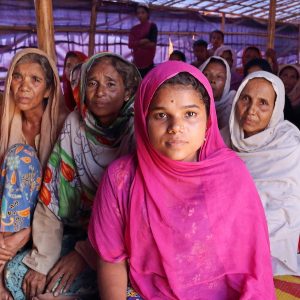
Photo by Fabeha Monir.
International Day for the
Elimination of Racial Discrimination
March 21, 2019 – Parliament Hill, Ottawa
In March 2018, Nobel Women’s Initiative conducted a fact-finding delegation in partnership with Bangladeshi organizations, and met with over 100 Rohingya women in two refugee camps, in Kutapalong and Thyankhali. Sexual violence is one of the largest atrocities committed in Myanmar, and we were able to witness, firsthand, how women are systematically targeted by the Myanmar military.
The vast majority of women who testified to the delegation were rape survivors. They provided first-hand accounts of the high-levels of violence they endured. An alarming majority of these women identified their perpetrators as members of the Myanmar Army. They were raped openly, in broad daylight by men in military apparel, often in public or just outside their home.
One of our partners Razia Sultana, a lawyer and researcher with the Kaladan Press —a Rohingya press network— has documented over 300 cases of women and girls raped in August 2017 alone. This only represents a fraction of the total number raped at this time.
Women have been detained, tortured, mutilated and killed in military camps, with the clear authorization of camp commanders. Rape, as we know, is a common tool for genocide, and in Myanmar the mutilation of women’s bodies, breasts and genitals was deliberately aimed to destroy the very means of reproduction of the Rohingya.
In 2018, the UN Fact-Finding mission on Myanmar, interviewed over 800 rape survivors and concluded there was a ‘very clear chain of command’ within the Myanmar Army. It called for the country’s military leaders to be investigated and prosecuted for ‘genocide, crimes against humanity and war crimes.’
The Myanmar Army’s latest atrocities against the Rohingya are not new, and must not be seen in isolation. Nobel Women’s Initiative has worked with multiple ethnic women’s groups in Burma over the past ten years who have been documenting these patterns for decades.
These latest atrocities are a continuation of a decades-long policy to divide-and-rule, occupy and control the ethnic territories, and seize their rich natural resources and land. In fact, Myanmar has recently passed amendments to the VFV law, making it easier for villagers’ lands to be confiscated.
To this date, the Myanmar Army continues to harass and torture Rohingya villagers inside Rakhine State, and continues to launch attacks and commit war crimes– including sexual violence, in Northern and Eastern Myanmar, with impunity.
As the only country to have formally recognized the Rohingya genocide, Canada is in a unique position to lead the international community towards justice and meaningful support for Rohingya women.
We call on the Canadian Government to:
- Increase humanitarian assistance to women refugee survivors in Bangladesh through local women’s organizations who have been responding to their needs, and are best equipped to continue doing so;
- Stop ‘business as usual’ with Myanmar. Canada should suspend all investments and direct aid, and redirect support to local civil society and women’s groups who are the real agents of change;
- Use all avenues available under international law to bring both individual perpetrators of the Rohingya genocide, and the State of Myanmar, to justice.
Why is a Nobel-winning human rights activist defending Myanmar on Rohingya atrocities?
Dec 11, 2019 PBS NewsHour
In 2017, the Myanmar military unleashed a reign of terror on Rohingya Muslims. According to the U.N., soldiers tortured, raped and killed civilians, driving hundreds of thousands to flee to neighboring Bangladesh. Now the International Court of Justice is trying Myanmar for genocide — as a human rights advocate defends its actions. Nick Schifrin talks to John Dale of George Mason University. Stream your PBS favorites with the PBS app: https://to.pbs.org/2Jb8twG Find more from PBS NewsHour at https://www.pbs.org/newshour Subscribe to our YouTube channel: https://bit.ly/2HfsCD6 Follow us: Facebook: https://www.pbs.org/newshour Twitter: https://www.twitter.com/newshour Instagram: https://www.instagram.com/newshour Snapchat: @pbsnews Subscribe: PBS NewsHour podcasts: https://www.pbs.org/newshour/podcasts Newsletters: https://www.pbs.org/newshour/subscribe
Category News & Politics
https://nobelwomensinitiative.org/laureate/
Meet The Laureates
Mairead Maguire
Northern Ireland, 1976
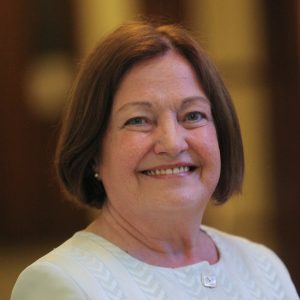
After three of her sister’s children were killed during the violence between Catholics and Protestants in Northern Ireland, Mairead Maguire organized massive demonstrations and other action calling for a nonviolent end to the conflict. Along with Betty Williams, she is the co-founder of Peace People, and together the two women won the Nobel Peace Prize in 1976. She has spent her life since then to bearing witness to oppression and standing in solidarity with people living in conflict, including most in Syria.
Together, they co-founded the Peace People, a movement committed to building a just and peaceful society in Northern Ireland. They organized each week, for six months, peace rallies throughout Ireland and the UK. These were attended by many thousands of people – mostly women, and during this time there was a 70% decrease in the rate of violence. Mairead currently serves as Honorary President.
Since receiving the award, Mairead has dedicated her life to promoting peace, both in Northern Ireland and around the world. Working with community groups throughout Northern Ireland, political and church leaders, she has sought to promote dialogue, nonviolence and equality between deeply divided communities.
A graduate from Irish School of Ecumenics, Maguire works with inter-church and interfaith organizations and is a councilor with the International Peace Council. She is a Patron of the Methodist Theological College, and Northern Ireland Council for Integrated Education. She is also the author of The Vision of Peace: Faith and Hope in Northern Ireland.
“If we want to reap the harvest of peace and justice in the future, we will have to sow the seeds of nonviolence, here and now, in the present.”
For more information please visit the following link:
Rigoberta Menchú Tum
Guatemala, 1992

Rigoberta Menchú Tum is a Mayan k’iche’ activist born in 1959 in Chimel, a small Mayan community in the highlands of Guatemala. As a young girl, Rigoberta traveled alongside her father, Vincente Menchú, from community to community teaching rural campesinos their rights and encouraging them to organize.
In 1960, ethnic and socioeconomic tensions engrained since colonization spurred a brutal civil war against the Mayan people. The military dictatorship, under the leadership of Efraín Ríos Montt, and rich landowners initiated the bloodshed. By the time a peace agreement was signed in 1996, 450 Mayan villages were destroyed, over 200,000 Guatemalans murdered and 1 million were displaced.
Rigoberta and her family mobilized Guatemalans during the war to denounce government-led mass atrocities. Their activism came at a great cost. At a peaceful protest held at the Spanish Embassy in Guatemala City in 1980, Rigoberta’s father and thirty-seven other campesino activists were murdered in a fire. Not long after, the Guatemalan army tortured and murdered Rigoberta’s brother and mother. At age 21, Rigoberta fled into exile.
Rigoberta spoke publicly about the plight of the Mayan people in Guatemala while in exile. In 1983 she published I, Rigoberta Menchú and catapulted the civil war into global headlines. She received the Nobel Peace Prize in 1992 in recognition of her work for social justice and ethno-cultural reconciliation based on respect for the rights of indigenous peoples. After receiving the prize Rigoberta returned to Guatemala and established the Rigoberta Menchú Tum Foundation (FRMT) to support Mayan communities and survivors of the genocide as they seek justice. Rigoberta and the Foundation have been key in advocating for justice in several high profile cases in Guatemala, including the trial against former dictator Efrain Ríos Montt in May 2013, the Spanish Embassy massacre in January 2015, and the case of 14 survivors of sexual violence in Sepur Zarco in February 2016.
Rigoberta ran for President of Guatemala in 2007 and 2011 under the banner of WINAQ, the first indigenous-led political party founded by herself. In 2013 the Autonomous National University of Mexico (UNAM) appointed her as a Special Investigator within its Multicultural Nation Program. She continues to seek justice for all Mayan people impacted by the genocide.
“Only together can we move forward, so that there is light and hope for all women on the planet.”
For more information please visit the following link:
Jody Williams
USA, 1997
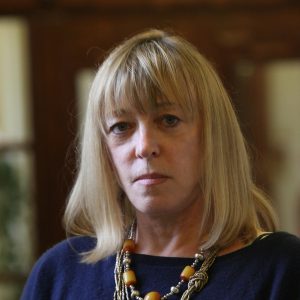
Jody Williams received the Nobel Peace Prize in 1997 for her work to ban landmines through the International Campaign to Ban Landmines, which shared the Peace Prize with her that year. At that time, she became the 10th woman – and third American woman – in its almost 100-year history to receive the Prize. Since her protests of the Vietnam War, she has been a life-long advocate of freedom, self-determination and human and civil rights.
Like others who have seen the ravages of war, she is an outspoken peace activist who struggles to reclaim the real meaning of peace – a concept which goes far beyond the absence of armed conflict and is defined by human security, not national security. Williams believes that working for peace is not for the faint of heart. It requires dogged persistence and a commitment to sustainable peace, built on environmental justice and meeting the basic needs of the majority of people on our planet.
Since January of 2006, Jody Williams has worked toward those ends through the Nobel Women’s Initiative, which she chairs. Along with sister Nobel Laureate Dr. Shirin Ebadi of Iran, she took the lead in establishing the Nobel Women’s Initiative. They were joined at that time by sister Nobel Laureates Wangari Maathai (Kenya), Rigoberta Menchú Tum (Guatemala) and Betty Williams and Mairead Maguire (Northern Ireland). The Initiative uses the prestige of the Nobel Peace Prize and the influence and access of the women Nobel Laureates themselves to support and amplify the efforts of women around the world working for sustainable peace with justice and equality.
Since 1998, Williams has also served as a Campaign Ambassador for the International Campaign to Ban Landmines. Beginning in early 1992 with two non-governmental organizations and a staff of one – Jody Williams, she oversaw the Campaign’s growth to over 1,300 organizations in 95 countries working to eliminate antipersonnel landmines. In an unprecedented cooperative effort with governments, UN bodies and the International Committee of the Red Cross, she served as a chief strategist and spokesperson for the ICBL as it dramatically achieved its goal of an international treaty banning antipersonnel landmines during a diplomatic conference held in Oslo in September 1997.
Williams continues to be recognized for her contributions to human rights and global security. She is the recipient of fifteen honorary degrees, among other recognitions. In 2004, Williams was named by Forbes Magazine as one of the 100 most powerful women in the world in the publication of its first such annual list.
She holds the Sam and Cele Keeper Endowed Professorship in Peace and Social Justice at the Graduate College of Social Work at the University of Houston where she has been teaching since 2003. In academic year 2012-2013, she became the inaugural Jane Addams Distinguished Visiting Fellow in Social Justice at the University of Illinois at Chicago.
Her memoir on life as a grassroots activist, My Name is Jody Williams: A Vermont Girl’s Winding Path to the Nobel Peace Prize was released by the University of California Press in early 2013.
“We must teach ourselves to believe that peace is not a ‘utopian vision’, but a responsibility that must be worked for each and every day.”
For more information please visit the following link:
Shirin Ebadi
Iran, 2003
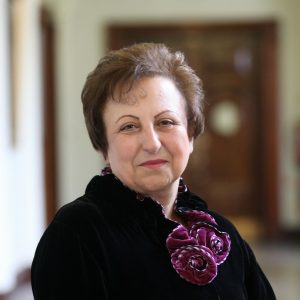
7
Shirin Ebadi, J.D., was awarded the 2003 Nobel Peace Prize for her efforts to promote human rights, in particular, the rights of women, children, and political prisoners in Iran. She is the first Muslim woman to receive the Nobel Peace Prize, and only the fifth Muslim to receive a Nobel Prize in any field.
Dr. Ebadi was one of the first female judges in Iran. She served as president of the city court of Tehran from 1975 to 1979 and was the first Iranian woman to achieve Chief Justice status. She, along with other women judges, was dismissed from that position after the Islamic Revolution in February 1979. She was made a clerk in the court she had once presided over, until she petitioned for early retirement. After obtaining her lawyer’s license in 1992, Dr. Ebadi set up private practice. As a lawyer, Dr. Ebadi has taken on many controversial cases defending political dissidents and as a result has been arrested numerous times.
In addition to being an internationally-recognized advocate of human rights, she has also established many non-governmental organizations in Iran, including the Million Signatures Campaign, a campaign demanding an end to legal discrimination against women in Iranian law. Dr. Ebadi is also a university professor and often students from outside Iran take part in her human rights training courses. She has published over 70 articles and 13 books dedicated to various aspects of human rights, some of which have been published by UNICEF. In 2004, she was named by Forbes Magazine as one of the 100 most powerful women in the world.
In January 2006, along with sister Laureate Jody Williams, Dr. Ebadi took the lead in establishing the Nobel Women’s Initiative.
“Human rights is a universal standard. It is a component of every religion and every civilization.”
For more information please visit the following link:
Leymah Gbowee
Liberia, 2011

Leymah Gbowee received the Nobel Peace Prize in 2011 for her work in leading a women’s peace movement that brought an end to the Second Liberian Civil War in 2003. Gbowee shared the prize with fellow Liberian Ellen Johnson Sirleaf and Yemen-native Tawakkol Karman. Gbowee and Sirleaf became the second and third African women to win the prize, preceded by the late Wangari Maathai of Kenya.
Leymah is the founder and president of Gbowee Peace Foundation Africa based in Liberia. Her foundation provides educational and leadership opportunities to girls, women and youth in West Africa.
Leymah was born in central Liberia in 1972. She was living with her parents and sisters in Liberia’s capital, Monrovia, when the First Liberian Civil War erupted. She recalls clearly the day the first Liberian civil war came to her doorstep. “All of a sudden one July morning I wake up at 17, going to the university to fulfill my dream of becoming a medical doctor, and fighting erupted.”
Witnessing the effects of war on Liberians, she decided to train as a trauma counsellor to treat former child soldiers.
A second civil war broke out in 1999 and brought systematic rape and brutality to an already war-weary Liberia. Responding to the conflict, Leymah mobilized an interreligious coalition of Christian and Muslim women and organized the Women of Liberia Mass Action for Peace movement. Through Leymah’s leadership, thousands of women staged pray-ins and nonviolent protests demanding reconciliation and the resuscitation of high-level peace talks. The pressure pushed President Charles Taylor into exile, and smoothed the path for the election of Africa’s first female head of state, fellow 2011 Nobel Laureate Ellen Johnson Sirleaf. Documenting these efforts in the Tribeca Film Festival 2008 Best Documentary winner Pray the Devil Back to Hell, Leymah demonstrated the power of social cohesion and relationship-building in the face of political unrest and social turmoil.
In 2007, Leymah earned a Master’s degree in Conflict Transformation from Eastern Mennonite University in the United States. Meanwhile, she continued to build women’s agency in fighting for sustainable peace. She is a founding member and former coordinator for Women in Peacebuilding/West African Network for Peacebuilding (WIPNET/WANEP). She also co-founded the Women Peace and Security Network Africa (WIPSEN-Africa) to promote cross-national peace-building efforts and transform women’s participation as victims in the crucible of war to mobilized armies for peace.
Ever-focused on sustaining peace, Leymah continued working on behalf of grassroots efforts in her leadership positions. She served as a member of both the African Feminist Forum and the African Women’s Leadership Network on Sexual and Reproductive Rights, and as a commissioner-designate for the Liberia Truth and Reconciliation Commission. Through these positions, Leymah addressed the particular vulnerability of women and children in war-torn societies.
In her current position as President of Gbowee Peace Foundation Africa, Leymah pushes for greater inclusion of women as leaders and agents of change in Africa.
Since winning the Nobel Peace Prize, Leymah travels internationally to speak about the pernicious and devastating effects of war and gender-based violence. She has been featured on a number of international television programmes including CNN, BBC and France24, and speaks internationally advocating for women’s high level inclusion in conflict-resolution. She has received several honorary degrees from universities, and is a Global Ambassador for Oxfam.
She serves on the Board of Directors of the Nobel Women’s Initiative, Gbowee Peace Foundation and the PeaceJam Foundation, and she is a member of the African Women Leaders Network for Reproductive Health and Family Planning. She has received honorary degrees from Rhodes University in South Africa, the University of Alberta in Canada, Polytechnic University in Mozambique, and University of Dundee in Scotland. After receiving the Barnard College Medal of Distinction in 2013, she was named a Distinguished Fellow in Social Justice. Leymah is the proud mother of six children.
When asked how she first found the courage to become a peace activist, Leymah explained: “When you’ve lived true fear for so long, you have nothing to be afraid of. I tell people I was 17 when the war started in Liberia. I was 31 when we started protesting. I have taken enough dosage of fear that I have gotten immune to fear.”
“It is time to stand up, sisters, and do some of the most unthinkable things. We have the power to turn our upsidedown world right.”
For more information please visit the following link:
Tawakkol Karman
Yemen, 2011
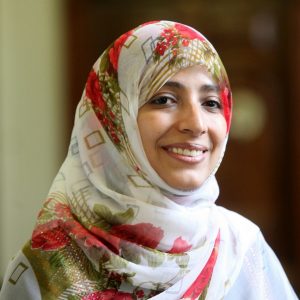
Tawakkol Karman was known as “The Mother of the Revolution” and was awarded the Nobel Peace Prize in 2011 in recognition of her work in nonviolent struggle for the safety of women and for women’s rights to full participation in peacebuilding work in Yemen. Upon being awarded the prize, Tawakkol became the first Yemeni, the first Arab woman, and the second Muslim woman to win a Nobel Peace Prize, as well as the youngest Nobel Peace Laureate at the time, at the age of 32.
Karman is a mother of three as well as a human rights activist, journalist, and politician.
Tawakkol was born in 1979 in Taiz, Yemen’s third largest city. She studied an undergraduate degree in Commerce from the University of Science and Technology in Sana’a before completing a graduate degree in Political Science from the University of Sana’a.
Growing up in a politically tumultuous country, Tawakkol witnessed the unification of North and South Yemen in 1990, followed by a civil war between the two factions in 1994 in which the North triumphed over the South. The civil war led to dissidence in the South as the repressive Northern government assumed control over the country.
A journalist by profession and human rights activist by nature, Tawakkol responded to the political instability and human rights abuses in Yemen by mobilizing others and reporting on injustices. In 2005, she founded the organization Women Journalists Without Chains, (WJWC) which advocates for rights and freedoms and provides media skills to journalists. In addition, the organization produces regular reports on human rights abuses in Yemen, documenting more than 50 cases of attacks and unfair sentences against newspapers and writers to date.
In 2007, Tawakkol began organizing weekly protests in Yemen’s capitol, Sana’a, targeting systemic government repression and calling for inquiries into corruption and other forms of social and legal injustice. Tawakkol’s weekly protests continued until 2011, when she redirected protesters to support the Arab Spring. Tawakkol even brought Yemen’s revolution to New York speaking directly with UN Secretary General Ban Ki-Moon and organizing rallies at the UN headquarters.
Bold and outspoken, Tawakkol has been imprisoned on a number of occasions for her pro-democracy, pro-human rights protests. Amongst Yemen’s opposition movement, she is known as “mother of the revolution” and “the iron woman.”
Since receiving the award, Tawakkol has continued to support female journalists and rally Yemenis against government corruption and injustice. Fiercely committed to change, Tawakkol spends the majority of her time in a tent in Change Square, where she continues her peaceful protests for justice and freedom.
“You have to be strong; you have to trust yourself that you can build a new country. You have to know that you have the ability to achieve your dream.”
For more information please visit the following link:
Wangari Maathai
Founding Member – Kenya, 2004
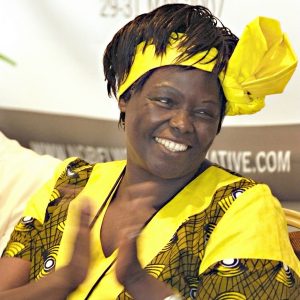
Dr. Wangari Muta Maathai was awarded the Nobel Peace Prize in 2004 for her actions to promote sustainable development, democracy and peace and was the first African woman to receive the Nobel Peace Prize. She passed away in September of 2011.
The first woman in East and Central Africa to earn a doctorate degree, Professor Maathai was an active member of the National Council of Women of Kenya from 1976 to 1987 and served as its chairman from 1981 to 1987. In 1976 she introduced the idea of community-based tree planting. She continued to develop this idea into a broad-based grassroots organization whose main focus is poverty reduction and environmental conservation through tree planting. The organization eventually became known as the Green Belt Movement (GBM), and to-date has assisted women in planting more than 40 million trees on community lands including farms, schools and church compounds.
In December 2002, Professor Maathai was elected to Kenya’s parliament with an overwhelming 98 percent of the vote. Until 2007, she represented the Tetu constituency, Nyeri district in central Kenya (her home region). From 2003 to 2007 Professor Maathai served as Assistant Minister for Environment and Natural Resourcesin Kenya’s ninth parliament.In September 1998, Professor Maathai launched and become co-chair of the Jubilee 2000 Africa Campaign, which advocates for canceling the debts of poor African countries. Her campaign against land grabbing (illegal appropriation of public lands by developers) and the rapacious re-allocation of forest land received much attention in Kenya and the region.
In June of 2008 the Congo Basin Forest Fund was launched. The fund protects the forests of the Congo Basin by supporting projects that make the forest worth more as a living resource, than it would be cut down. Professor Maathai acted as co-chair and goodwill ambassador for the initiative.
Professor Maathai addressed the United Nations on several occasions and spoke on behalf of women at special sessions of the General Assembly for the five-year review of the 1992 Earth Summit. In March 2005, she was elected as the first president of the African Union’s Economic, Social and Cultural Council.
She authored four books; an autobiography, Unbowed, and an explanation of her organizational method, The Green Belt Movement: Sharing the Approach and the Experience. The Challenge for Africa and Replenishing the Earth were both released in 2010.
“It’s the little things citizens do. That’s what will make the difference. My little thing is planting trees.”
For more information please visit the following link:
Betty Williams
Founding Member – Ireland, 1976

“The Nobel Peace Prize is not awarded for what one has done, but hopefully what one will do.” These are the words of Betty Williams, who in 1976 along with Mairead Maguire, was awarded the Nobel Peace Prize for her work to end the sectarian violence in her native Northern Ireland.
Williams was one of the six founding members of the Nobel Women’s Initiative in 2006. She currently heads the World Centers of Compassion for Children International, which was founded in 1997 in honour of His Holiness the Dalai Lama. The organization is headquartered in the Republic of Ireland, and is building the first City of Compassion for children in the Basilicata Region of southern Italy. Williams left the Nobel Women’s Initiative in 2011 in order to devote more time to her work there.
“Compassion is more important than intellect in calling forth the love that the work of peace needs, and intuition can often be a far more powerful searchlight than cold reason.”
For more information please visit the following link:
For more information please visit the following link:
https://nobelwomensinitiative.org/laureate/
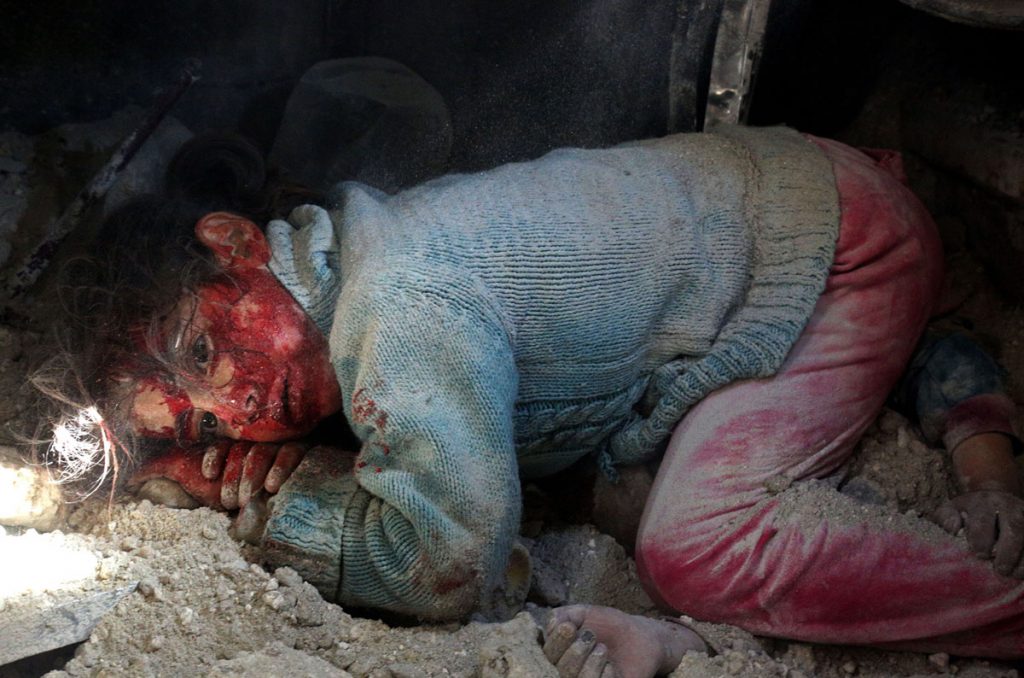
A wounded Syrian girl awaits rescue from under the rubble next to the body of her sister (hands visible at right), who did not survive a regime bombardment in Khan Sheikhun in the southern countryside of the rebel-held Idlib province, on February 26, 2019. Five months after this photo, the Syrian photographer who took it, Anas Al-Dyab, was killed in an air strike in Khan Sheikhun. Al-Dyab was also a member of the “White Helmets,” a group of volunteers carrying out search-and-rescue efforts in Syria.
Anas Al-Dyab / AFP / Getty
For more information please visit the following link:
https://www.theatlantic.com/photo/2019/12/top-25-news-photos-2019/602848/
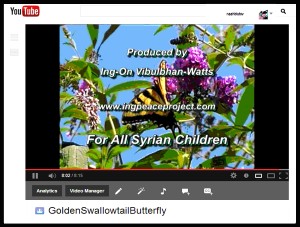
GoldenSwallowtailButterfly (8:15 minutes)
Aug 24, 2013 naahblubiv (Ing-On Vibulbhan-Watts)
To All Syrians from the Golden Swallowtail Butterfly
Beautiful Golden Swallowtail Butterfly
Summersaults in the sky
Drinking sweet nectar
For the beautiful wings to fly
The golden wings span out
Showing the black accented lines
A highlight for your beautiful wings
Two perfect tails you have
But a broken wing
Knowing how far you came from
Do you pass by Syria lately?
No! No one cultivates the gardens
They are busy fighting with each other
No trees, no plants
No flowers giving me the nectar to drink
They are running away
From their homes and their land
One million children are refugees now
What are you doing Syrian people?
Everybody stops fighting
Please come!
Plant your trees for butterflies and bees
Show your children how nice butterflies can be
They help to fertilize your plants
Producing fruits for your children to enjoy
Syrian people you have a long culture
Your arts and your country are beautiful
Do not ruin your ancestors’ good reputation
Preserve your culture for your children to grow
Show your children your fruitful gardens
And the beautiful Golden Butterfly will visit you
The butterfly says,
You will see no tears
No fear on your children faces
But the sound of your children’s laughter
The joy of seeing my beautiful wings
Everybody stops using weapons
Please come!
To enjoy your tasty food
Your dance, your music, your arts
And your ancient civilization
We want to visit you
Show us how civilized Syrian Society can be
Ing-On Vibulbhan-Watts, Friday, August 23, 2013, 9:45 pm
The Golden Swallowtail Butterfly was captured by me on Saturday, August 17, 2013 at our backyard garden in downtown Newark, New Jersey. I would like to dedicate this video to all the children in Syria.
Please visit
for more pictures and information
Category Education
Leave a Reply